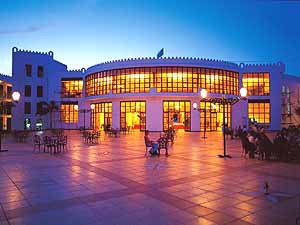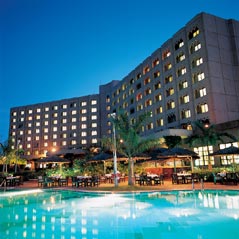Destination: |
Dar Es Salaam, Tanzania Hotels and City Guide
Dar Es Salaam Hotels and Dar Es Salaam Guide with Dar Es Salaam maps, top attractions, room reservations and hotel deals at a wide range of the best Dar Es Salaam hotelsDar Es Salaam - Travel Tips
When to Go - Seasons
When to Go - Public Holidays
Local Customs & Language
Health Advice
Security Advice
Visa and Passport Information
When to Go - Seasons
Being an equatorial country, Tanzania does not have definitive seasons but rather two rainy seasons interspersed with a dry season.
If your reason for visiting Tanzania is to experience the awesome massive wildebeest migrations from Serengeti to Kenya, visit it between December and July. The heaviest concentration of game can usually be seen during January and February.
If it is the predators that attract you, go between June and October.
When to Go - Public Holidays
1 January - New Year’s Day
12 January - Zanzibar Revolution Day
5 February - Chama Cha Mapinduzi Day
16 February - Eid ul Moulid (the birth of the Prophet Mohammed)
7 April - Karume Day
22 April - Good Friday
25 April - Easter Monday
26 April - Union Day
1 May - Labour Day
1 July - Bank Holiday
7 July - Saba Saba, Dar es Salaam Trade Fair
8 August - Peasants’ Day
30 August - Eid ul Fitr (end of Ramadan)
31 August - Eid ul Fitre Holiday
14 October - Nyerere Day
7 November - Eid ul Adga (pilgrimage to Mecca)
9 December - Independence Day
25 December - Christmas Day
26 December - Boxing Day
2012: The following religious holidays fall on different dates in 2012:
5 February - Eid ul Moulid
6 April - Good Friday
9 April - Easter Monday
19 August - Eid ul Fitr
27 October - Eid ul Adga
Local Customs & Language
Customs
Each of the 130 tribes has its own traditions and customs seen in their dances and the way they dress.
Maasai dances involve much leaping to a deep rhythmic chant. The men wear a togo and usually carry traditional weapons like spears, knives and clubs. Their bodies are covered in ochre. Maasai women are beautifully adorned with beaded and metal jewellery from their ears, around their necks, arms and legs.
The Makonde tribe file their teeth and scar their faces and bodies. The Sukuma tribe dance with live pythons. Coastal and island people adorn their hands, feet, lips and nails with henna, depending on the occasion.
Haggling is normal when shopping at markets and when negotiating a price with taxi drivers.
Language
Swahili is the official language, but English is spoken and used in business.
General Etiquette
In order not to offend the local Muslims who form a large percentage of the population, dress conservatively when not in a tourist resort and especially in the coastal areas and in Zanzibar. Women should not wear shorts or sleeveless tops, particularly in Stone Town.
Drunkenness, loud behaviour and swearing are offensive. Smoking is banned in public places and offices. Restaurants allow smoking in designated smoking areas. Hotels have smoking lounges.
Health Advice
Health
VIP: Do not leave home without medical insurance.
Malaria is rife in the low-lying areas of Tanzania. Make sure you take a course of prophylactics, starting a week before you set out for Tanzania, and continue with the course throughout your visit and for another fortnight after returning home. In the evenings and early mornings protect yourself from bites by wearing long trousers, socks and long-sleeved shirts. Pack an insect repellent. Mosquito nets are usually provided at the safari camps.
Yellow Fever is a viral infection causing hepatitis. You will need a vaccination certificate if coming directly from an infected area. A Yellow Fever vaccination certificate may be requested when entering Zanzibar.
Sleeping Sickness is carried by a certain species of tsetse fly in the bush, which gives a nasty bite.
Bilharzia is a serious water-borne disease, humans being the primary host for parasitic flatworms that live and deposit their eggs in the lining of the bladder or large intestine until expelled when the human host urinates or defecates into water. The eggs hatch in the water and enter freshwater snails, the secondary host, where they mature. The snails release the larvae which are able to penetrate the human skin within seconds of contact. And the cycle begins again. Do not swim or wash in lakes, rivers or pools, no matter how enticing they look on a hot day. And do not drink water from them. Lake Victoria particularly has a high infestation of bilharzia, a most debilitating and often dangerous disease.
Tanzania is riddled with AIDS.
Other natural hazards
This is Africa, so scorpions, spiders and snakes appear during and after the rains. Stings and bites are uncommon among tourists.
The coral waters of the Indian Ocean also have their hazards. Beware of the poisonous spines of sea urchins. Pull out the spines as quickly as possible. If they don’t come out easily, get medical help. Poisonous well-camouflaged stonefish hide under the surface of the sand. If poisoned, pour really hot water over the affected area to deactivate the toxin of the stonefish, but get treatment as soon as possible. Coral scratches should be treated with an antiseptic as should any other cuts, bites and stings, as they can become infected.
Tap water is not safe for drinking, brushing teeth or for making ice-cubes. Do not eat raw vegetables, and peel all fruit. Hotels and lodges provide treated water in flasks. If not staying in such accommodation, boil or sterilise drinking water and milk.
Use the toilets in hotels and restaurants rather than public ones.
Health Services
Qualified doctors and pharmacies are found in the main towns, while many of the safari lodges and camps in the national parks either have resident qualified doctors or they can be summoned by radio. Kilimanjaro walkers and climbers are evacuated in an emergency.
Hospital in Dar Es Salaam
Aga Khan Hospital (including dental)
Ocean Road
Dar es Salaam
Tel: +255 22 211 5151/53
Security Advice
Violent crime, kidnappings, muggings and robberies are sadly common in Dar es Salaam. ATMs are vulnerable as is the Ubungo bus station and areas in the CBD frequented by backpackers and tourists. Do not wear jewellery, have cameras on show or carry large sums of money, all rich pickings for pickpockets and muggers. Do not take a ride in an unlicensed taxi and certainly do not accept lifts from strangers. Do not walk alone, especially at night, and avoid isolated areas and beaches. Visitors have been the victims of armed crime in Dar es Salaam and on Coco beach.
Do not drive out of town at night. Drunk drivers are a danger as are poorly maintained roads. Continue driving if flagged down by someone not wearing a uniform.
Somali pirates are a real and present danger to shipping, large and small. It is no longer safe to sail in the Indian Ocean as pirates have launched many attacks off the coast of Tanzania. Yachts, small fishing boats and tourist vessels are sitting ducks for pirates. It stands to reason that it is not sensible to take part in yacht races in such a high-risk area.
Terrorist attacks by Islamic groups are a fact of life in East Africa. Homosexuality and drugs are banned in Tanzania.
Safety in the Outdoors
If trekking or climbing, deal with reputable agencies, walk in groups and do not deviate from established routes. Be prepared for below-freezing temperatures on Mount Kilimanjaro where the fittest climber can succumb to altitude sickness. Make sure you have insurance to cover medical treatment, accidents and evacuation by helicopter.
The stunning national parks of Tanzania also present certain dangers as they are remote and evacuation difficult. Wild animals are dangerous, particularly if you are on foot or at close range. Always heed the advice of the wardens.
Emergency Numbers: Police: 999, Fire 111, Ambulance 112.
Visa and Passport Information
Citizens of the following Commonweath countries require visas:
United Kingdom, Canada, Nigeria, India, Pakistan, South Africa, Australia and New Zealand.
Citizens of the following countries do not require a visa for a stay of up to 90 days:
Botswana, Gambia, Ghana, Hong Kong, Kenya, Lesotho, Malawi, Malaysia, Mozambique, Namibia, Rwanda, Swaziland, Uganda, Zambia and Zimbabwe.
Nationals of all other countries require visas. Visa forms can be downloaded from the Internet.
Visas can be obtained on arrival at any Tanzanian entry point. You will need a completed application form, valid passport (not less than 6 months from date of entry), two passport size photos, and a supporting letter for a business visa.
Passport Information
All visitors require a passport valid for 6 months from date of entry into Tanzania.
Hotels in Dar Es Salaam, Tanzania
 | Holiday Inn Dar Es SalaamGarden Avenue Dar Es Salaam TANZANIA 152 guest rooms and 2 suites 5 floors We have a well lit and secure parking area which can accommodate at least 50 cars |  |
 | Golden Tulip Dar Es SalaamPO Box 20200, 6300, Dar Es Salaam This luxurious hotel is spacious with 84 comfortable designed rooms and 6 suites all with balconies offering splendid views over the Indian Ocean and the City. The hotel's architecture has traditional Arabic influences, which is characteristic on the East African Coast.... |  |
 | M�evenpick Royal Palm HotelP.O. Box 791,Ohio Street,Dar es Salaam,Tanzania, Hotel Introduction A beacon of hospitality in the heart of this Tanzanian city, the Moevenpick Royal Palm offers travellers a welcoming haven of comfort and unrivalled luxury. Stylish and elegant, the hotels magnificient lobby mirrors the sophisticated... |  |
Get Listed | Advertise | Contact | Terms | Privacy Policy | Legal | Mismi Digital | Partners | Sitemap




 TripAdvisor
TripAdvisor TripAdvisor
TripAdvisor